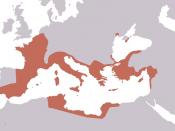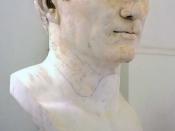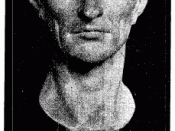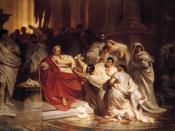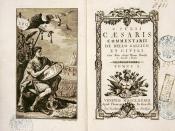Leaders Among Us The death of a tyrannical emperor and the refusal of a teenager to sell chocolates are two very different story lines. Yet the leaders in both stories use the same techniques and act similarly. The followers also are also depicted in similar manners in the ways they respond to being led. The leaders also used the same methods in gaining and maintaining their power through manipulation and fear. In these two pieces of literature, The Chocolate War ,and Julius Caesar, the leaders and the followers are portrayed very much alike.
A leader is someone who is the head of a group. To be effective leaders the must have certain qualities; one of these qualities is a good public speaker. Marc Antony is an excellent public speaker and is always able to convince his listeners of his point. The people say after listening to his speech "Methinks there is much reason in his sayings" (Shakespeare III, ii, 118).
By being able to convince the general public of what he is saying and his point, he is effectively leading them. Another good trait of a leader is a quick thinker; Antony is good at this also. He uses his swift thinking to more easily convince the populace of Rome. When speaking at Caesar's funeral, he thinks to bring up the will of Caesar by saying "But here's a parchment with the seal of Caesar. / I found it in his closet. 'Tis his will"(III, ii, 140-141). Antony could not have possibly been to Caesar's home to get the will before his speech, but he briskly thinks of another way to convince the plebeians. One more necessity to being a good leader is having underlings to help you. Antony has one person that he treats as an underling but who is his political equal. This is Lepidus, who rules in the second Triumvirate with Antony and Octavius. Antony sees Lepidus as "a slight unmeritable man, / meet to be sent on errands" (IV, i, 14-15). Having an underling makes the leader feel more powerful. In The Chocolate War Archie is the leader of the Vigils. He displays qualities similar to those of Antony in the way that he is a very good public speaker. He always uses psychological means rather then fists. He convinces Emile Janza that "â¦guys like Renault are your enemies, not guys like meâ¦Then Archie had provided the door-slammerâ¦" which further convinces Janza (Cormier 173). Archie's power is in the way he can speak and convince people. Archie is also a quick thinker like Antony is. Archie surprised even those who knew him well with his ability to think on his feet. "Obie marveled at the way Archie ran the meetings and how The Vigils quickly took his cues" (123). He speaks with grace and is able to think rapidly on his feet. An underling is very important to Archie's success also. His accomplice Obie is always "picking up the pieces behind him, of performing those little servicesâ¦"(101). Obie does all the dirty work that Archie doesn't want to or doesn't have to do. The leaders of a private school in the seventies and the leaders of Rome in 44 BC are very much alike in many respects.
A leader cannot be a leader with out followers. The followers play key roles in both literary works. In Julius Caesar the most obvious followers are the plebeians. Some of their qualities are negative however. One of their worst qualities is they think like a group. The plebeians have no sense of individuality. Several times in the book the all say the same thing at once without any directions. One example is when Antony is preparing to descend the steps and they all say "Stand back! Room! Bear back!" (Shakespeare III, ii, 180). This is a bad quality because there is no room for individual ideas if all of the plebeians think alike. Another one of the qualities they believe everything that their leader says and are easily convinced. This is good because it also shows a sense of faith in their leader. It also shows disciple among the followers. When Antony is trying to convince the plebeians to rebel against the conspirators he only has to say "In every wound of Caesar that should move / the stones of Rome to rise and mutiny" (III, ii, 242-243). The plebeians yell back "We'll mutiny" (III, ii, 244). By immediately shouting back the plebeians are demonstrating their ability to think like a group. In The Chocolate Wars the students at Trinity display the same characteristics as the plebeians. The student body thinks like a group and if you are disliked by one you are disliked by all. In the giant raffle that Archie holds Jerry gets placed "â¦at the mercy of the school, the students" (Cormier 174). He is brutally beaten up by Janza and has no hope except a few students who feel sorry for him. Another way the student body is like the plebeians is that they believe everything that they are told by Archie. When it is spread around that Jerry was not selling chocolates his teammates "â¦dropped his passes purposely, [and] had refused to block" (152). They do this because they believe everything they are told, and so the players unjustly dropped Jerry's passes. The followers in The Chocolate War and in Julius Caesar are very much alike in both their positive and negative sides.
When comparing leaders and followers in books, it is hard to overlook the methods used by the leaders to gain and maintain their power. In these two books both leaders use manipulation to gain their power. Antony uses the plebeian's submissiveness to get revenge against the traitors. After his speech he says out loud " Now let it work. Mischief, thou art afoot; / take thou what course thou wilt" (Shakespeare III, ii, 275-276). He uses manipulation to have to plebeians do what he wants them to do. To maintain the power Antony gained through stratagem he instills fear in his followers. By making the plebeians fearful of him he is able to hold his position longer and is less likely to have people challenging him over it. When speaking at Caesar's funeral he dramatically lifts up Caesar's cloak and says "Kind souls, what, weep you when you but behold / our Caesar's vesture wounded? Look you here, / Here is himself, marred as you see with traitors" (III, ii, 207-209). By showing the plebeians the gory sight of Caesar's thrashed body he subconsciously instills fear in them. Neither of these are good ways to keep subjects but they work well for both Antony and Archie. Archie convinced other kids to do his dirty work for him. This consisted of "those Vigil assignments that had made him practically a legend at Trinity" (Cormier 12). By assigning people to do mischief he himself gained more power and respect through manipulation. To maintain the power Archie had, he used fear. The younger kids at Trinity looked up to him however, this was mostly out of fear. The freshmen did not want get on the bad side of the Vigils because they then risked getting picked for one of the infamous assignments. In one incident "â¦the kid was quick to comply and Archie was pleased with his submissiveness" (174) Archie then realizes "I am Archie. My wish becomes command" (174). Archie uses fear to intimidate and rule the school. No one ever questions his authority because of fright he instills in his followers. Both of the leaders in these books use dishonest means to help gain and maintain their power. To gain it they use manipulation and to maintain it they use fear.
In these two books, The Chocolate War and Julius Caesar, the leaders and the followers are portrayed very much alike. Both the leaders are good speakers, quick thinkers, and have underlings. The followers are also similar in that they believe everything that is said to them and they think like groups. The leaders both gain and maintain power in the same ways, using fear and manipulation. Even though these two books do not look the same on the cover they are in actuality very similar.
